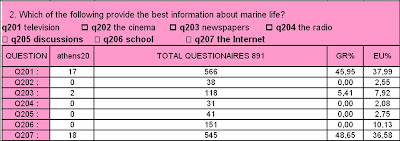On: Sustainable Sea
Comparison of Survey Results among the participant countries
To: Monsieur Bernard Garcin,
Coordinator of the project CLEAN TECH: SUSTAINABLE SEA – V2CL Sept 2009 – March 2010
By: the Greek Team
Teachers in charge: K. Fyssaki – S. Soubassi
Date: 02/02/2010
Introduction
The aim of this report is to compare and contrast the findings of a recent survey on Sustainable Sea – Sea animals – and Rivers in the participant countries carried out by the student teams in the framework of the eTwinning program called CLEAN TECH: SUSTAINABLE SEA – V2CL SEPTEMBER 2009-MARCH 2010.
The following aspects are going to be dealt with:
BEST-KNOWN ANIMAL SPECIES IN SEA & OCEANS
As regards the 2 best-known animal species in sea & oceans, it was established that a significant number of the Greek respondents think that fish (47.5%) & mammals (45.0%) are the most famous species. By contrast, the European partners responded that fish are the first best-known animal species (43.2%), while mammals being the second best-known species (24.8%).
In addition, it was reported that no one of the Greek respondents considered mollusks as the best-known sea animal species.
BEST-KNOWN MAMMALS IN MARINE LIFE
As far as what Greek people knew about sea mammals is concerned, it was found out that most Greek teenagers were mostly aware of the dolphins (36.4%), while other European people considered seals as the most-known sea mammal (20.9%).
Notably, Greek people ignored the existence of porpoises, rorquals, eared seals and walruses.
INFORMATION ABOUT THE MOST NUMEROUS & THE MOST ENDANGERED SPECIES
As far as the people’s answers are concerned, it was established through the questionnaire that according to the opinion of the Greek people, dolphins is the most numerous species in seas and oceans (62.5%), followed by both whales and seals (each 16.7 % respectively). Similarly, the other European citizens that answered the questionnaire, were of the opinion that dolphins are the most numerous, too (26.6 %), followed by seals (23.2 %).
As far as the danger of extinction is concerned in this survey, it was found out that 80% of Greek people believe that seals face the danger of extinction more than any other sea animal. On the other hand, other European people consider whales as the most endangered species (21,2%).
QUALITY OF RIVER WATER
As far the quality of river water is concerned, the survey indicated that more than two thirds of the Greek people (69.2%) answered that the community is just informing citizens about the situation. On the contrary, European people (18.7%) are of the opinion that the community is improving river water quality by setting up waste water treatment factories.
SOURCES OF INFORMATION
As for the sources from which the Greek respondents (45% female and 55% male most of whom were under 20 years old in percentage 90% and between 40 and 50 years old in percentage 10%), have drawn their knowledge about marine life sources, a striking percentage (48.65%) mentioned internet, 45.95% mentioned television and 5.41% newspapers. Respectively, the European respondents (just as many male 46.1% as female 53.9%, most of whom were either under 20 (percentage 44,3%) or between 40 and 50 years old (percentage 20.19% ), have heard about marine life sources mostly from television in percentage 39.99% and from the Internet 36.58% and from school in percentage 10.13% respectively.
According to the answers given, we come to the conclusion that Greek people are best informed by the internet (48.95%), with television coming to second place (45.95%). On the contrary, European people think that television provides the best information (37.99%), while internet is the second best medium by which someone can be informed (36,58%)
CONCLUSION
On the whole, it could be concluded that the Greek population inquired in the survey tended to ignore many of the sea animal species given, such as porpoises, walruses, mollusks and rorquals and were more aware of dolphins and whale species. There are some major differences in the species known by both parts, as stated before, and also there is a grave problem, considered the perception of what community does in order to improve the quality of river water.
(The final report was written by Fabio Abajai and all pupils of the group APL_TRITH, participants to the programme)










































